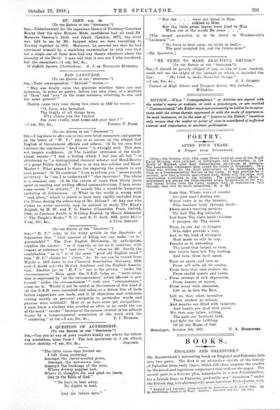[To THE EDITOR OF THE " SPECTATOR.") Sea,—" H. C."
asks, in his witty article in the Spectator of September 21st, "what amount of filling out can make 'as to' presentable?" The New English Dictionary, by anticipation, supplies the answer : "as it regards, so far as it concerns, with respect or reference to" (sub voce "as," sense no. 33). Surely the combination "as to" is of the same "good old English stock" that "H. C." claims for "about," &c, its use can be traced from Wyclif c. 1375 down to the Classical Association (January, 1918) and—I doubt not—the British Academy and the English Associa- tion. Another jar on "H. C.'s " ear is the phrasv 'under the circumstances." Here agair the N.E.D. helps us: "mere situa- tion is expressed by 'in the circumstances,' action affected is per- formed 'under the circumstances ' " (sub race "circumstance," sense no. 4). Would it not be useful in discussions of this kind if (1) the N.E.D. were consulted and taken as a datum line of facts before suggestions are made, and if (2) objections and criticisms resting merely on personal antipathy to particular words and phrases were withheld? Most of us have some pet antipathies : I once knew a student who avoided as often as he could the use of the word "render " because of the nausea created in his delicate frame by a temperamental association of the word with the


































 Previous page
Previous page